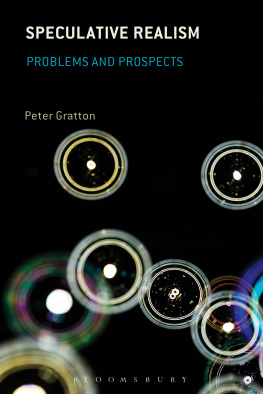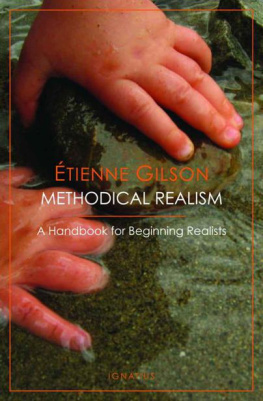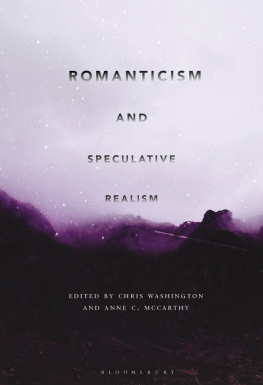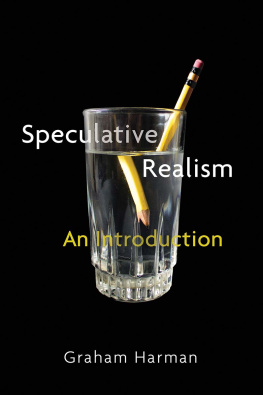SPECULATIVE REALISM
Also available from Bloomsbury
AFTER FINITUDE
Quentin Meillassoux
POST-CONTINENTAL PHILOSOPHY
John Mullarkey
SPECULATIVE REALISM
PROBLEMS AND PROSPECTS
Peter Gratton

Bloomsbury Academic
An imprint of Bloomsbury Publishing Plc
| 50 Bedford Square | 1385 Broadway |
| London | New York |
| WC1B 3DP | NY 10018 |
| UK | USA |
www.bloomsbury.com
Bloomsbury is a registered trade mark of Bloomsbury Publishing Plc
First published 2014
Peter Gratton, 2014
Peter Gratton has asserted his right under the Copyright, Designs and Patents Act, 1988, to be identified as Author of this work.
All rights reserved. No part of this publication may be reproduced or transmitted in any form or by any means, electronic or mechanical, including photocopying, recording, or any information storage or retrieval system, without prior permission in writing from the publishers.
No responsibility for loss caused to any individual or organization acting on or refraining from action as a result of the material in this publication can be accepted by Bloomsbury Academic or the author.
British Library Cataloguing-in-Publication Data
A catalogue record for this book is available from the British Library.
ePub ISBN: 978-1-4411-8802-1
Library of Congress Cataloging-in-Publication Data
A catalog record for this book is available from the Library of Congress.
Typeset by Deanta Global Publishing Services, Chennai, India
CONTENTS
Speculative realism is an area of philosophy declared just 7 years ago. Now it is a Continental philosophy splinter group with dedicated blogs, at least two online journals, numerous commentaries in articles both popular and academic, and yes, this book. To those critical of speculative realism, this quick movement is enough to deny its importance. Continental philosophy, with its creaky traditions and often-hideous nomenclature, is said to be in a time of transition. Philosophy, the fear is, has become even more of a bazaar of self-branding academics pumping out articles and books and pushing new systems of thought with clunky titles (neo- this , meta- that ) buttressed in a few cases by nothing more than a few months of thinking, a couple of blog posts, and an adorable ability to insert the words what I like to call before the most prosaic of ideas. (What I like to call physicality, as opposed to physics...) We hearten ourselves by saying other disciplines may be worse, even as we measure if weve made it by our number of citations in those departments. (Did you know my work drop an octave to give the appropriate gravitasis often cited by sociologists and gardeners?) Gone are the days when careers were made by reading The German Thinker, making his translated verbiage your own, and then spending a lifetime tossing out repetitive essays saying the key to his work is to be found on some slip of paper you discovered on the floor of his archive. Gone is the time when you could make a career ventriloquizing the words of the Thinker so much that you would quote him (and it was invariably a him) in every chapter or essay you wroteas well as love letters and the occasional holiday card. Sure you can still get by with obsequiousness to whoever is still alive in France and Germany after the deaths of Derrida et al. But to make it for real these days, the cynical will claim, you must have a system , and it better come with a ready-made politics. Which, of course , youll say, it does , since its the subject of your forthcoming book; anyone can have a book forthcoming , and it is best to have several to have a trump card to throw into any conversation at conferences: I too have a chapter on that in a book Im writing, you know. No need to be shy, some among us say about new movements in academia. Those thinkers before you were monumentally wrong anyway, and youll invent some new word for describing how their thought led to Nazism or cancer or some other malady you are free to dream up. Be fearless in building your opponents in the history of philosophy with straw and setting them ablaze. Fortune favors the bold, not the sucker who has to read everything before saying anything.
Better, too, to have that system as soon as possible: Plato gave his philosopher kings some 50 years to develop their chops; he obviously never had to upload his CV to Interfolio. Youll need bona fides for applications for jobs that no longer exist in a discipline funded off, it seems, bake sales and whatever change falls out of the pockets of the Dean of Business. Books have to be pressed and nobody is waiting for the next Gadamer to publish his first major work at sixty. Despite the poverty, you will find this liberating, this new age of uploaded treatises and downloaded podcasts. You are no longer a pre-given labelso strange it must have been to be known by someone elses name: Derridean, Foucaultian, Deleuzian, Arendtian.... You can make up your own labelthough pro tip: best not to end your catchphrase with ology, which tends to make even the most tantalizing field sound like a melanoma. If youre having trouble with a label, just throw post, trans, or meta in front of a name youve already heardpostmaterialism, metanaturalism, and so on are just there for the taking. But you must write in a tone that no one has thought this before, and treat readers as if they didnt know familiar things about the contemporary world: computers, brain scans, cell phones, and so on. And worry little about changing labels every few months; you should peel them off as often as inveterate shoplifters pull off price tags. Tell those who think its inconsistent with your older, now months-old work they didnt understand your work in the first place.
Am I not giving into this whole cynical viewpoint here with this book? A few years in and we have a movement? Is someone, somewhere negotiating the merchandising rights, too? No doubt youll tease me for my gullibility. I dont doubt theres good reason for the cynicism outlined above. The loss of numerous teaching jobs in philosophy has happened at the same time as scholars have had easier access to publishing options online, which has meant a heavier burden to identify oneself quickly, to make a name before one even has a name on a regular paycheck. Ray Brassier, who came up with the term speculative realism and ever since has told anyone with ears to listen that he has burned his membership cardone gets the idea he would rather be revealed as a member of Campus Crusade for Christinsinuates that speculative realism is just one more marketing label, as can be seen from an interview given a couple of years ago:
The speculative realist movement exists only in the imaginations of a group of bloggers promoting an agenda for which I have no sympathy whatsoever: actor-network theory spiced with pan-psychist metaphysics and morsels of process philosophy. I dont believe the Internet is an appropriate medium for serious philosophical debate; nor do I believe it is acceptable to try to concoct a philosophical movement online by using blogs to exploit the misguided enthusiasm of impressionable graduate students. I agree with Deleuzes remark that ultimately the most basic task of philosophy is to impede stupidity, so I see little philosophical merit in a movement whose most signal achievement thus far is to have generated an online orgy of stupidity.
Some scary scare quotes there. And lurid details of an online orgy of stupidity. By now, youre waiting for me to pivot here and begin chastising Brassier for being too young to shake his cane at the hooligans endangering his lawn; where I discuss the brilliance, the world-historical innovation of Graham Harman, Quentin Meillassoux, or whomever from a movement you might have just heard of when you picked up this book. Where I detail my conversion experience and describe my penitence before the holy trinity of speculative materialism, object-oriented ontology, and pan-psychist metaphysics.
Next page









